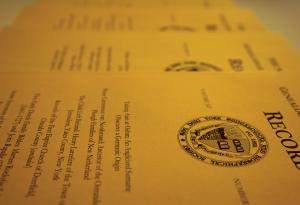The New York Genealogical and Biographical Record is an important resource for anyone researching their New York State ancestors.
The archive of The Record holds many names and dates in thousands of rare record transcriptions, compiled genealogies, and case studies—many of them can’t be found anywhere else.
But did you know this periodical is valuable for far more than the millions of names and dates in its volumes?
Regularly reading articles in The Record will help you become a better researcher. By reading the peer-reviewed work of expert researchers, you’ll be able to make more discoveries and solve your own challenging brick walls.
Read on for several important reasons to regularly read The Record.
The articles are peer-reviewed and written by experts
For more than forty years, Record articles have gone through a rigorous, peer-reviewed writing and editing process.
As authors draft and research, they consult with the top experts in the subject area of their article. These experts read drafts, make comments, review proofs and citations, and generally make sure the article that winds up being published is a well-polished piece of scholarship.
Between the expertise of the article author, the experts chosen for peer-review, and the journal’s editor, you can be sure that articles in The Record are top-tier scholarship.
This means they are especially worth reading, studying, and learning from—you can be sure you're learning from the best.
Study how authors analyze evidence
The Record is invaluable because it lets you get inside the head of an expert researcher and see how they think.
By reading the articles closely, you can follow the author’s thought process and understand how and why they draw conclusions from the evidence they uncover.
When you read an article, the central problem is often outlined in the opening paragraphs. Pay close attention and keep this challenge in mind as you read through the rest of the article.
This will improve your own skills at analyzing evidence, and is a great way to learn concepts like indirect evidence – with enough reading and studying, you will eventually master some of the more complex ways to analyze evidence, and can use this for your own brick walls.
Try this out by starting with an article from the most recent issue—the problem is often stated in the opening paragraphs. Pay close attention to this problem and keep it in mind as you follow along with the author’s thought process.
Discover new record sets and learn how to use them
The citations in every Record article hold many treasures for those who know to sift through them.
By looking closely at what sources genealogists use to find evidence, you will undoubtedly discover new collections, archives, and websites that are relevant to your own research.
The citations (and sometimes the main narrative of the article) often give advice and commentary about these sources and how to get the most out of them. You never quite know what kind of sources an author is going to incorporate, so it’s important to read all articles closely. You’ll surely encounter many pleasant surprise learnings!
Find essential information about the key places in your family history research
This one might have the most immediate benefit—use our website to find Record articles that involve the town or county of your ancestors.
There are many local idiosyncrasies and general record-keeping inconsistencies throughout New York State. By reading the work of experts who have researched in the same place, you can follow their footsteps and absorb their commentary about the location. This will undoubtedly help you make more discoveries.
Reading articles will also help you learn more about the social and historical context of the place. You will find gleanings that help you draw better conclusions about your ancestors who lived there.
Go ahead and search The Record for names of places that are important in your family history research. You can also search the Article Title and Location index, which allows you to filter results by location.
Learn important contextual information about groups of people
Even if you cannot find a specific individual in The Record, chances are there is something written on someone who has similar characteristics. Studying these articles will leave you with numerous learnings you can apply to your own search.
For instance, reading one of the many articles on Loyalists can help your own quest to find out more about your Loyalist ancestor. The citations will reveal important sources, and the articles themselves will shed more light on the overall experience of those who shared these characteristics.
Another example—Irish immigrants. A particularly challenging group to research, but one covered numerous times in articles in The Record. See how the expert authors find their Irish immigrant subjects, and you will come away with ideas about things you can try in your own research.
Next Steps
To get started improving your skills, read the most recent issue of The Record and keep the above in mind.
If you would like to learn more about searching the archive of The Record and using our multiple indexes, read our article, 5 Ways to Use The NYG&B Record Online Archive.
